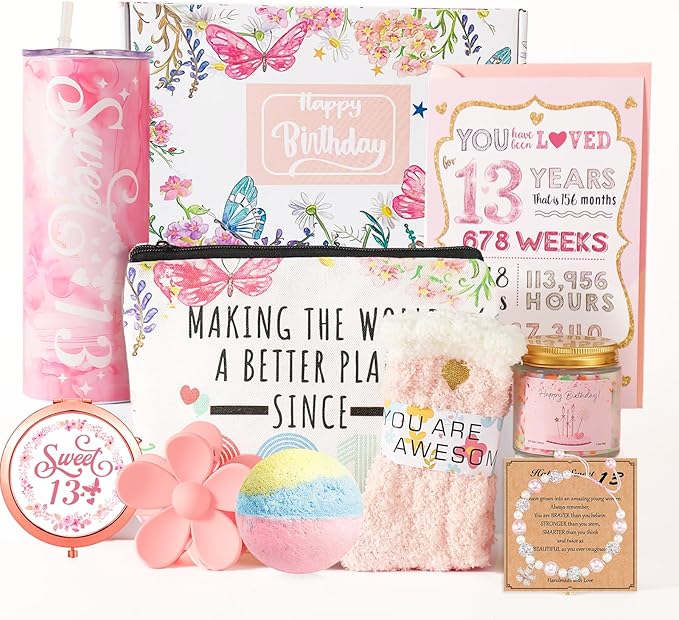Discover the dynamic journey of being a 13-year-old girl, from self-discovery and deepening friendships to overcoming academic challenges and peer pressure. This article offers insights into building self-esteem, fostering creativity, maintaining health, and celebrating achievements.

Navigating the world as a 13-year-old girl is a unique and exciting journey full of discovery and change. At this age, you’re standing on the brink of adolescence, where every day brings new challenges and opportunities to grow. It’s a time when friendships deepen, interests blossom, and the world seems both vast and full of possibilities.
You’re likely finding your voice and beginning to express yourself in ways that feel true to who you are. Whether it’s through fashion, music, or hobbies, your individuality starts to shine. Embracing these changes can be thrilling, yet sometimes a bit overwhelming. This period is all about exploring what makes you, well, you.
Key Takeaways
- Adolescence and Self-Discovery: At 13, navigating the cusp of adolescence involves unique milestones and opportunities for self-expression, such as fashion, music, or hobbies, fostering personal growth and self-identity.
- Emotional and Social Development: Understanding emotional changes and building self-confidence are critical during this transformative time. Forming healthy friendships and effectively handling peer pressure contribute significantly to emotional well-being.
- Academic and Personal Balance: Developing effective study habits and managing school stress are essential. Achieving this balance supports academic growth while also encouraging extracurricular engagement and exploring new interests.
- Physical and Mental Health: Encouraging regular exercise and understanding nutritional needs are crucial for a 13-year-old’s development, contributing to overall well-being and establishing lifelong healthy habits.
- Family Communication and Technology Use: Establishing strong family communication helps navigate the challenges of adolescence. Embracing technology safely is important for learning and connection, with a focus on safe social media practices.
- Celebrating Achievements: Recognizing personal achievements reinforces self-confidence and motivation, encouraging a positive self-view and ongoing personal development.
Navigating Teenage Milestones
As a 13-year-old girl, you’re entering an exciting phase full of unique milestones. These moments shape your journey toward adulthood and help you discover who you are.
Understanding Emotional Changes
Navigating emotions can feel like an uncharted adventure. Hormonal shifts may bring new feelings like mood swings and increased sensitivity. Recognize these changes as part of growing up and try to express your emotions in healthy ways. Journaling, talking to trusted friends, or seeking guidance from family or counselors can make a difference. Learning about coping strategies and mindfulness can also help in managing stress and anxiety.
Building Self-Confidence
Developing self-confidence is crucial during this transformative time. Celebrate small victories like acing a test or mastering a new skill. Embrace your individuality by exploring interests that ignite your passion. Whether it’s painting, coding, dancing, or writing, nurturing these hobbies boosts self-esteem. Surround yourself with positive influences, including supportive friends and mentors, who encourage you to believe in your potential. Set realistic goals and take pride in your achievements, big and small. Plus, creating a positive self-talk habit can progressively build a solid confidence foundation.
Supporting Academic Growth
Navigating the academic landscape as a 13-year-old can be both exciting and challenging. Supporting your academic growth means building effective study habits and learning to manage school stress.
Encouraging Study Habits
Developing strong study habits paves the way for academic success. Start by creating a dedicated study space free from distractions like TV and loud noises. Organize materials with folders, planners, and study lists to keep track of assignments and due dates. Use tools like flashcards, online quizzes, and study apps to reinforce learning. Setting a consistent schedule helps balance study time and leisure, so make sure to allocate specific times for homework and revision. Break tasks into smaller, manageable sections to avoid procrastination and enhance focus. Embrace active learning by teaching challenging subjects to friends or family members, which deepens understanding. Remember to take short breaks to maintain concentration during intensive study periods. Celebrate your achievements, no matter how small, to stay motivated and encourage progress. When studying, find techniques that suit your learning style, such as visual aids, mnemonic devices, or teaching others. Joining study groups can also provide a valuable exchange of ideas and support.
Managing School Stress
School stress can sometimes feel overwhelming, but there are effective strategies to manage it. Start with good time management by prioritizing tasks and setting achievable goals. Practice relaxation techniques such as deep breathing, meditation, or yoga to reduce anxiety. Maintaining a healthy lifestyle with nutritious meals, regular exercise, and adequate sleep plays a crucial role in stress management. Stay organized by using calendars or planners to keep track of important dates and avoid last-minute rushes. Communicate openly with teachers if you’re struggling, as they’re there to help and support you. Take time to unwind by engaging in hobbies or fun activities that bring joy and relaxation. Seek support from family or friends when feeling overwhelmed by schoolwork or peer pressure. Practice positive self-talk to boost confidence and minimize stress. Learn to recognize when you’re stressed and take a moment to pause and reset. Every challenge is an opportunity for growth, so approach them with a positive mindset.
Fostering Healthy Friendships
At 13, building strong and meaningful friendships is crucial for emotional and social growth. It’s a time when connections with peers can shape your self-esteem and daily experiences.
Recognizing Positive Influences
Spotting the right friends can greatly impact your happiness. Look for friends who encourage and support you. Surrounding yourself with positive influences helps build resilience. Friends who celebrate your achievements and motivate you to pursue your interests are invaluable. Consider those who offer honest feedback kindly, always keeping your best interests at heart. It’s essential to seek friendships where mutual respect and understanding flourish. Stick close to those who appreciate your individuality and encourage you to be yourself. Embrace friends who show empathy during tough times and share laughter during happy moments. Lastly, cherish friendships that thrive on shared values and common goals, setting a foundation for lasting bonds.
Navigating Peer Pressure
Dealing with peer pressure is a common challenge during this age. It’s important to trust your instincts when you feel uncomfortable with certain situations or requests from peers. Establishing boundaries can help you maintain your values and priorities. Practice saying “no” confidently to activities that don’t align with who you are. Having supportive friends makes resisting peer pressure easier. Engage in open discussions about peer pressure with trusted friends or adults. They can offer advice and strategies for handling difficult situations. Equip yourself with coping mechanisms, like deep breathing or seeking distraction, to manage uncomfortable peer scenarios. Focus on friendships that respect your decisions, ensuring you stay true to yourself.
Promoting Physical Well-being
A 13-year-old girl’s physical well-being plays a crucial role in her overall development. Understanding the importance of exercise and nutrition sets the foundation for a healthy lifestyle.
Encouraging Regular Exercise
Engaging in regular physical activity benefits not just the body but also the mind. Encourage participation in various forms of exercise to find what suits her interests. Consider options like joining a soccer team, participating in gymnastics, going for daily walks, or dancing in a local studio. Trying out swimming, playing tennis, or biking can also be exciting. Encourage her to explore yoga for flexibility or martial arts for self-discipline. Activities like roller skating, hiking, and rock climbing provide both challenge and adventure. Finding a balance between structured sports and fun activities keeps exercise enjoyable and motivating.
Understanding Nutritional Needs
Eating a balanced diet supports growth and energy levels at this pivotal age. Introduce her to the importance of consuming a variety of fruits like oranges, apples, and bananas, and vegetables such as carrots, broccoli, or spinach for essential vitamins. Protein sources like chicken, beans, and tofu help build muscles. Healthy fats from avocados, nuts, and olive oil contribute to brain health. Encourage drinking milk or consuming yogurt for calcium, and whole grains like oats, brown rice, and quinoa for sustained energy. Limit sugary snacks, opting for healthier choices like nuts or yogurt with honey. Understanding these nutritional needs creates lifelong habits that nourish the body during these transformative years.
Exploring New Interests
Venturing into new interests can be a fulfilling part of being thirteen. At this stage, you might find yourself drawn to fresh hobbies and activities that strengthen your self-discovery journey.
Discovering Hobbies and Talents
Embrace your creative side by exploring a range of hobbies. You could try sketching, painting, or even crafting unique DIY projects. If you enjoy music, consider taking up an instrument like the guitar, piano, or drums. Writing poetry or short stories can also be a wonderful outlet for self-expression. Dance forms like ballet, hip-hop, or contemporary might interest you if you love to move. Cooking and baking offer rewarding experiences, while gardening connects you with nature. Try photography for a new perspective, or delve into digital art and graphic design to combine creativity with technology. Finding a hobby or talent that resonates with you can become a joyful escape and a source of accomplishment.
Engaging in Extracurricular Activities
Participation in extracurricular activities enhances both skills and social connections. Explore joining a school club like debate, drama, or chess, where you can sharpen your thinking and meet like-minded peers. Sports such as basketball, soccer, or track and field offer a chance to stay active while developing teamwork and leadership qualities. For community involvement, think about volunteering at local charities or environmental groups. Language clubs provide an opportunity to learn about new cultures. Science or tech clubs can ignite a passion for innovation. Finally, don’t hesitate to try out for school musicals, orchestras, or art exhibitions to showcase your talents. Engaging in these activities helps discover strengths and builds lasting friendships along the way.
Establishing Family Communication
Navigating the teenage years can be a whirlwind of emotions and experiences. Establishing strong family communication helps ensure you have support during this time.
Creating Open Dialogue
Encourage open dialogue by inviting everyone to share their thoughts and feelings. Start by discussing everyday topics like school projects, favorite TV shows, or weekend plans. Show genuine interest in her world; ask about her favorite books, sports, or even those trending TikTok videos she enjoys. Use dinner time for relaxed conversations or consider regular family meetings where everyone can speak freely. Emphasize listening over solving problems to create a safe space for her to express herself. Laugh together by sharing funny anecdotes or planning family game nights for a relaxed environment. Suggest journaling as a way for her to organize her thoughts, followed by discussion with a trusted family member. Above all, acknowledge her emotions and encourage her to ask questions about things she might find confusing.
Setting Boundaries and Expectations
Define clear boundaries and expectations to help her feel secure and understood. Discuss appropriate screen time, curfews, and chores in a collaborative manner. Encourage her input when setting rules about social media usage or attending events with friends. Be consistent with consequences for breaking rules but be flexible enough to adjust as she matures. Use positive reinforcement to celebrate her responsible decisions or achievements, whether it’s finishing homework on time or helping with household tasks. Agree on priorities like schoolwork before leisure activities. Encourage her involvement in setting routines for study time, family evenings, and other commitments. Most importantly, make sure she knows family values and the importance of respect within the household. Regular check-ins help adapt boundaries to her growing independence while maintaining support.
Embracing Technology Safely
Navigating technology can be daunting for a 13-year-old girl, yet it holds endless opportunities for learning and connection. It’s crucial to embrace technology safely, ensuring it enhances rather than hinders your well-being.
Understanding Social Media Use
Social media platforms offer ways to stay connected but can sometimes feel overwhelming. Understanding the purpose of each platform, like Facebook for staying in touch with family or Instagram for exploring interests, helps you manage usage effectively. Limit screen time by setting daily reminders, engage positively by following inspiring accounts, and think before you post to maintain a healthy online presence. Be cautious about sharing personal information, like your address or school name, and use privacy settings to control who sees your content.
Navigating Online Safety
Maintaining online safety is essential as you explore the digital world. Equip yourself with knowledge about common online threats like phishing scams and cyberbullying. Use strong, unique passwords for each account and enable two-factor authentication whenever possible. Be wary of accepting friend requests from strangers and report any suspicious behavior or bullying to a trusted adult. Educate yourself about safe downloading practices to avoid viruses or malware. When using public Wi-Fi, consider a VPN to protect your information. Remember, staying informed is your best defense against online risks.
Celebrating Personal Achievements
Recognizing achievements is a fantastic way to boost confidence and motivation. At 13, every accomplishment, no matter how small, deserves to be celebrated. Here are some creative ways you can mark those special moments:
- Create Achievement Journals: Writing down every milestone builds a tangible record of successes. You could personalize it with stickers, drawings, or doodles. Include stories about each achievement and how you felt at the time.
- Host Small Celebrations: Go beyond birthday parties by organizing small gatherings for other achievements. Invite family and friends to join in the fun with themes like backyard picnics, outdoor movie nights, or slumber parties.
- Craft Personalized Certificates: Making custom certificates is a great way to celebrate. Design them with fun colors, add meaningful quotes, and perhaps even include memorable photos related to the achievement.
- Use Achievement Boards: Visualize your accomplishments on a board. Cover it with photos, inspiring quotes, awards, or medals. Use fun shapes like stars or hearts to highlight each success.
- Initiate Reward Systems: Implement a system where every achievement earns you a reward. It could be simple treats like a special dessert, a book you’ve been wanting, or a fun outing like a trip to the zoo or an amusement park.
- Write Letters to Future Self: Document your achievements in letters addressed to your future self. Seal them in envelopes to open later and reminisce about your successes over the years.
- Share Stories with Empowering Networks: Sharing with supportive groups, whether they’re school clubs, online forums, or peer mentorship circles, can amplify your joy and inspire others.
- Create Digital Scrapbooks: Compile your memories in a digital format. Include pictures, notes, and even video snippets documenting your journey. Use apps or templates to design the scrapbook creatively.
- Organize Day Getaways: Plan a day getaway as a reward, perhaps to a theme park, museum, or nature reserve. A change in scenery can be a perfect way to celebrate and recharge.
- Display Achievements in a Memory Box: Keep a special box filled with tokens of your accomplishments. This could include trophies, certificates, ribbons, or significant objects that remind you of your success.
- Plan Personal Time with Loved Ones: Reward yourself with quality time with a parent, sibling, or friend. Enjoy activities like baking, hiking, or visiting a new café together.
- Host Achievement Showcases: Display artworks or projects in a mini exhibition at home. Invite friends and family to appreciate your creative efforts and celebrate your hard work.
- Design Custom T-Shirts or Accessories: Celebrate by designing unique T-shirts or charms that capture your achievements. Use decals, fabric paint, or embroidery to make them special.
Remember, celebrating personal achievements isn’t just about the act itself, it’s about recognizing your growth and the milestones in your journey to becoming who you are.
Conclusion
Navigating life as a 13-year-old girl is a journey filled with growth, discovery, and a fair share of challenges. It’s a time to embrace who you are, celebrate your achievements, and build a foundation for the future. Remember, you’re not alone in this journey. By surrounding yourself with positive influences, nurturing your interests, and maintaining open communication with family and friends, you can confidently face whatever comes your way.
Stay true to yourself, and don’t be afraid to express your individuality. Whether it’s through fashion, hobbies, or friendships, each experience adds to your unique story. Keep exploring, learning, and growing, and you’ll find that these transformative years are just the beginning of an exciting adventure.
Frequently Asked Questions
What are some effective ways for a 13-year-old girl to express individuality?
A 13-year-old can express individuality through fashion, music, and hobbies. Encouraging creative outlets like sketching, painting, or writing helps foster a unique identity. Participating in extracurricular activities such as sports, language clubs, or tech groups is also beneficial. These pursuits not only enhance skills but also build social connections and self-esteem, essential during adolescence.
How can young girls manage school stress effectively?
Managing school stress involves good time management, organizing study materials, and creating a dedicated study space. Practicing relaxation techniques, maintaining a healthy lifestyle, and seeking support from teachers, family, and friends also contribute to stress reduction. This approach encourages a positive mindset for navigating academic challenges.
What role do friendships play in a 13-year-old girl’s development?
Friendships are crucial for self-esteem and daily experiences. Positive peer influences encourage and support personal growth. Healthy friendships help navigate peer pressure by establishing boundaries and fostering open discussions. This supportive network promotes confidence and provides a foundation for developing strong interpersonal skills.
What are some strategies to build self-confidence during adolescence?
Building self-confidence involves celebrating small victories and embracing individual interests. Surrounding oneself with positive influences fosters a supportive environment. Setting realistic goals and practicing positive self-talk are key strategies, along with journaling and talking with trusted individuals. These practices help develop strong self-esteem.
What activities promote physical and mental well-being for a 13-year-old girl?
Regular exercise through team sports, gymnastics, yoga, or outdoor adventures enhances both physical and mental well-being. Understanding nutritional needs, like maintaining a balanced diet rich in fruits, vegetables, proteins, and healthy fats, is essential. These habits create a foundation for lifelong health and well-being.
How should families communicate with a teenage daughter effectively?
Effective communication involves creating an open dialogue and discussing everyday topics with genuine interest. Families should foster a safe space for expression, emphasizing listening over solving problems. Setting clear boundaries collaboratively helps the girl feel secure and understood, with regular check-ins and positive reinforcement.
What precautions should be taken when using technology?
To navigate technology safely, limit screen time and engage positively online. It’s essential to understand social media platforms and be cautious about sharing personal information. Educate oneself on online threats, use strong passwords, and report suspicious behaviors to trusted adults to maintain online safety.
How can personal achievements be celebrated to boost self-esteem in young girls?
Celebrating achievements creatively boosts confidence. Ideas include creating achievement journals, hosting small celebrations, crafting certificates, and using achievement boards. Initiating reward systems, writing letters to one’s future self, and sharing stories with supportive networks help acknowledge growth and motivate continued success.







